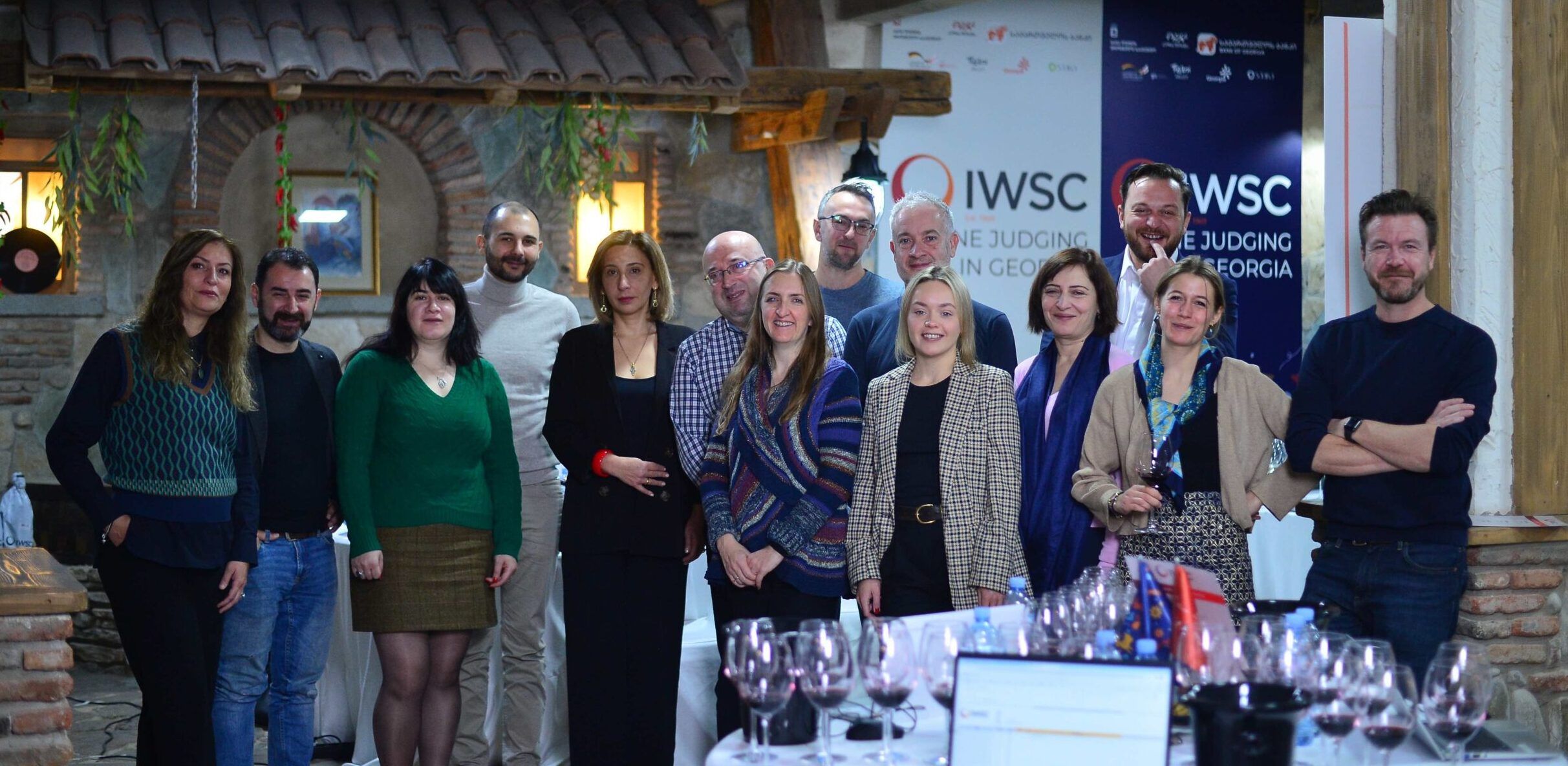The Georgia judging was the latest in a series of in location judging held by the IWSC in key countries around the world. You can access and find out all the medal winners in the Georgia competition here.
Georgia offers the wine lover a captivating contradiction: to most of us, it still represents something new, a voyage of discovery, yet its wine culture is almost as old as the hills on which the vines are planted, characterised by a style of winemaking that has scarcely changed in 8,000 years.
Roughly the size of Scotland, with a strategically important location between the Black Sea and the Caucasus Mountains, fertile soils and a relatively benign climate, it has always found itself coveted by neighbours, hence an exhausting history punctuated by struggles for independence.
When the Iron Curtain fell, Georgia became the Soviet Union’s wine region: both a blessing and a curse.Producing wines from factories, the emphasis was on quantity over quality, however, it did at least mean that viticulture survived, albeit based on two dominant varieties, Rkatsiteli and Saperavi.Georgia actually boasts 525 indigenous grapes, with some having survived in back gardens before being nurtured back to life at the country’s impressive grape research centre.
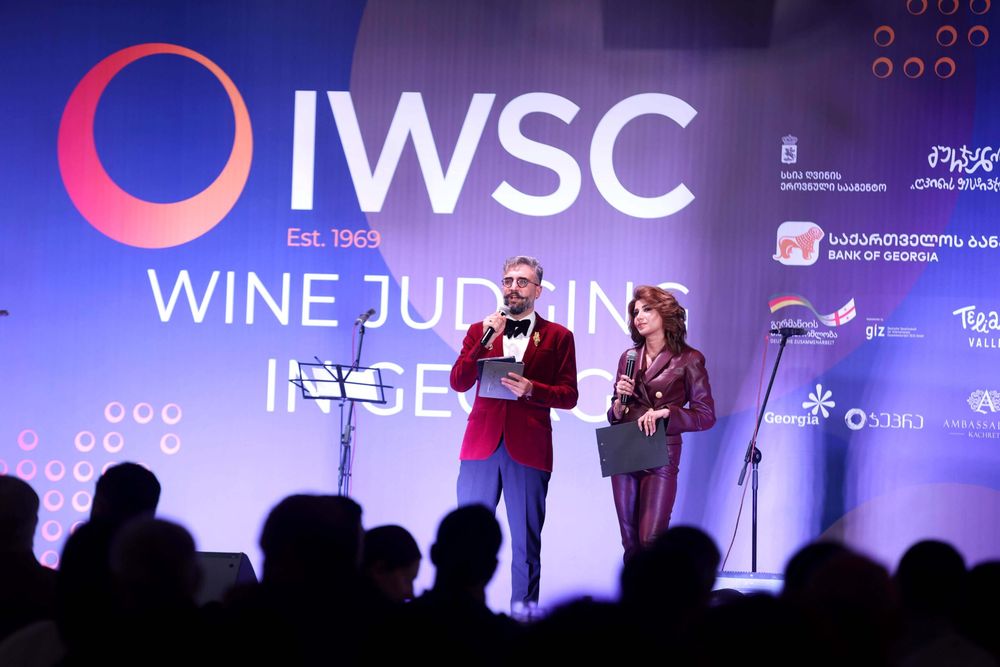
This was the first time the IWSC had held not only a judging session in Georgia but put on an actual awards ceremony for its producers too
As if a treasure trove of distinctive varieties once threatened with extinction was not sufficient to tempt us, Georgia also offers the archetype for a now-fashionable style of winemaking in amphora, with orange wines (the Georgians prefer ‘amber’) produced from clay pots buried underground (known as ‘qvevri’) which still represent as much as ten percent of the country’s output.
An international perspective
Georgia has a fraught relationship with its domineering northern neighbour Russia – still its biggest customer for wine – but as the country’s political leaders have nurtured relations with the EU and NATO, its wine industry has also been looking west, building successful new markets.
Precise figures for exports to the UK are hard to quantify, as many UK imports now come via European intermediate countries, but we know that sales have been booming, rising ten fold between 2017 and 2021, from around 70,000 to 700,000 bottles.With further growth in mind, Georgia’s National Wine Agency has been working with the IWSC to bring its international judges back to the country for a second time, to assess wines in situ, marking the start of the 2024 competition.
Forming part of the Gurjaani Wine Festival, the judging took place in Kakheti, Georgia’s largest wine region, with over 500 entries, including a number from neighbouring Armenia and Azerbaijan. Master of Wine Alistair Cooper led the assessment process, supported by four teams consisting of renowned experts and buyers, including Cat Lomax, Will Hill, Emma Penman, Georgios Iordanidis, Melania Battiston, Zara Serobyan, Salvatore Castano and myself, with each panel also featuring local experts.
The judges’ verdict
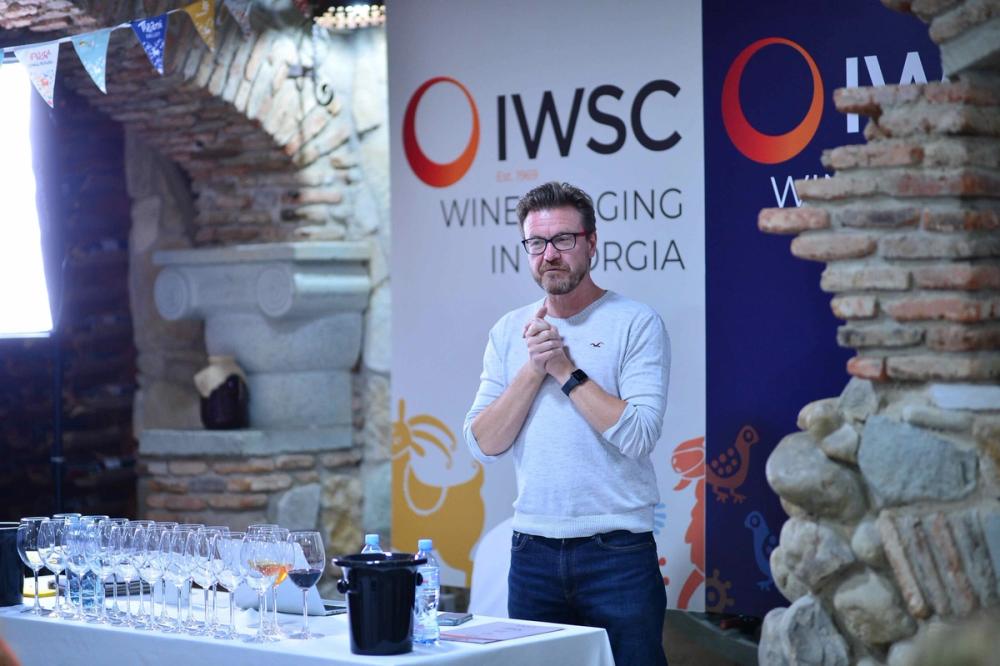
Alistair Cooper MW says he has seen a “qualitative leap forward” in the quality of Georgian wines tasted
Announcing that he was “thoroughly impressed,” Cooper outlined the striking improvement in quality that he had observed during the judging process:“This was my second visit to Georgia, my first being four or five years ago, and I have seen a qualitative leap forward.On my previous visit, we had some hygiene issues with certain wines, but we have seen a lot less of that this time. There’s been a huge step forward in the top end wines and we have found some absolutely world class examples. The improvement over the last decade has been really quite remarkable.”
In all, 285 medals were awarded to Georgian wines, including an impressive 18 golds, more than 70 silvers and over 190 bronze medals.
“Some of the top white wines to which we awarded golds were so memorable; the aromas, the personality of the individual grapes. They have an individuality stamped onto them,” said Lomax, a consultant who has worked with retailers including Laithwaite’s, Majestic Wine and M&S, as she urged wineries to pay attention to the judges’ constructive feedback, a key element of the IWSC’s proposition: “I was really pleased to see so few hygiene faults (however) there were still some potentialissues with oxidation in some of the wines.If you get feedback from us, as a group of wine judges, that your wine is slightly oxidised that’s definitely something to look at and consider.”
Qvevri wines shine
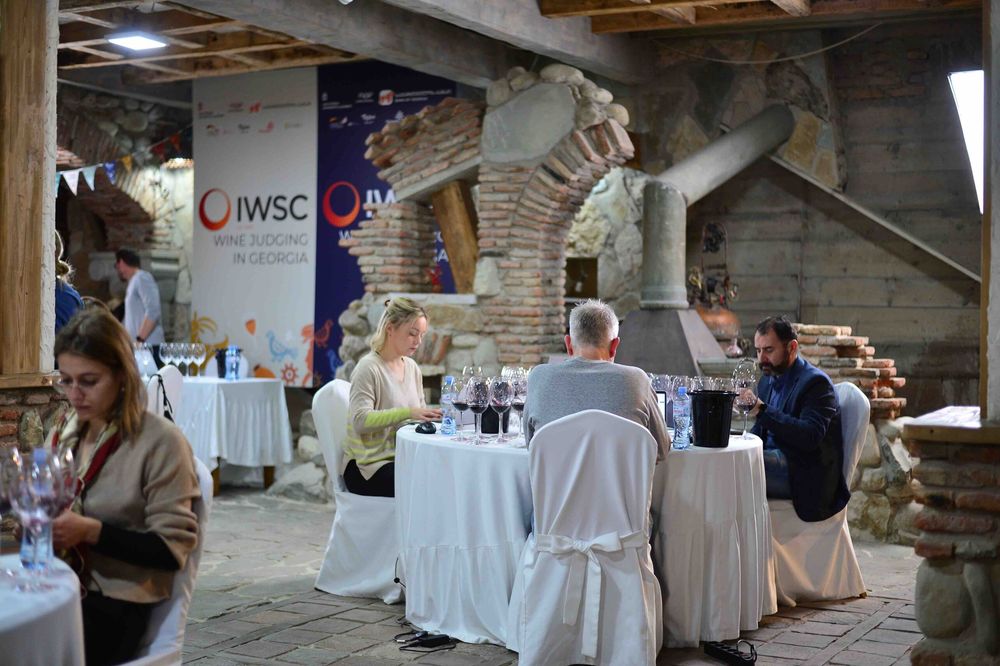
The judging brought together top UK wine professionals who travelled to Georgia to take part and judge alongside local experts
Demonstrating that heritage styles continue to deliver wines of distinction for Georgia, examples made in qvevri received eight gold medals and many more silver and bronze awards, with the highest-scoring wine of the judging sessions being a qvevri wine – Kardanakhi 1888 LLC Tsarapi 2020 – which earned 97 points, the judges labelling it a ‘superstar’ wine.
“There have been some exceptional qvevri wines. The ability these wines have to age is really quite remarkable,” said Cooper.
Hill, buying director for Novel Wines, said it was heartening to see heritage winemaking flourish: “The texture that can come from using qvevri is something that you don’t really get from other vessels … it gives such a unique character with added dimensions as the wines age. The drying finish needs to be carefully controlled but that gives something really unique.”
Reflecting on the qvevri wines she had tasted, Lomax was also impressed: “My big takeaway is that it really allows aromatics and perfume to remain in the wine. You get the character of the grape really coming through in an expressive way.”
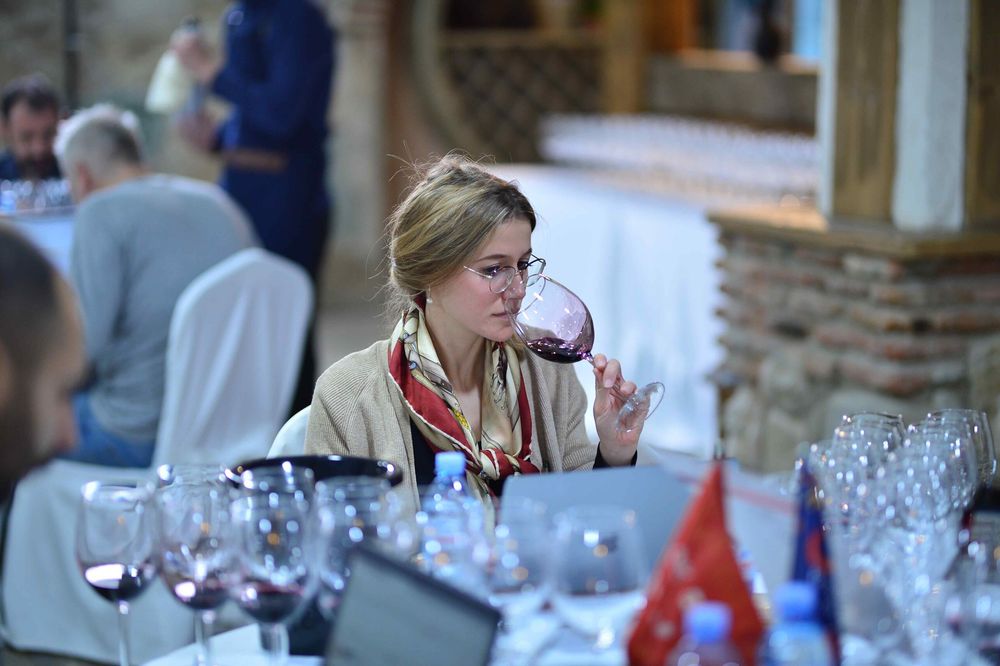
Sommelier Melania Battiston, previously of The Medlar, took part in the IWSC judging
Voyage of discovery
During a filmed discussion we enthused about the sheer diversity of the wines we’d tasted:“There were so many different styles on show and not just from one variety to another, but regionally too, (with) winemaking decisions that were very clear in the glass, so it has been really encouraging to see this kind of diversity … there is so much here to discover,” said Hill.
Saperavi performed strongly, with varietal wines winning five gold medals, the highest-scoring example coming from Mildiani Family Winery, which was also the most decorated producer across the judging, with a haul of 13 medals.
Drawing parallels with Malbec, Cooper talked of the potential for Georgia’s dominant red grape: “Saperavi is user friendly and accessible (so) it has a lot to offer.It’s a wild, juicy and inviting grape variety with the potential to age very well and it’s also easy (for consumers) to pronounce … One thing that really struck me was the judicious use of oak which was really quite restrained.”
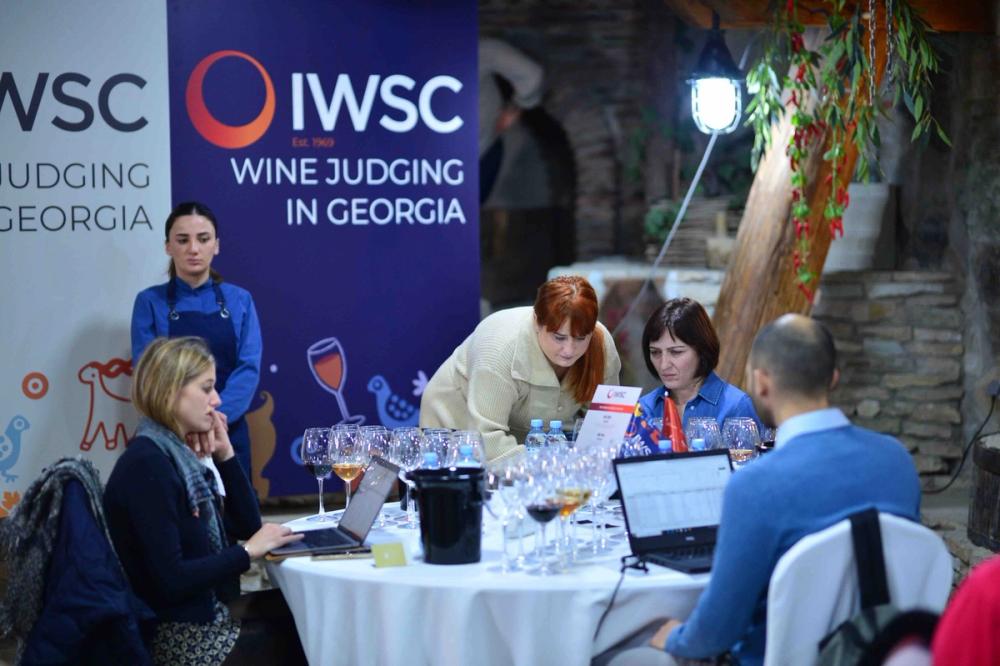
The judging was an opportunity for the UK judges to also experience Georgia, its culture and winemaking traditions
With her extensive retail experience, Lomax agreed that Saperavi offered huge opportunity for Georgia: “In terms of the overall style, it’s a really rich, ripe and juicy variety with a load of character and that’s exactly what consumers are looking for. The more successful wines are where the tannins have been reined in and are not too dominant. Malbec as a grape variety is going like a train in the UK, with exponential growth year on year, so offering consumers something (from Saperavi)which is stylistically similar, but a little bit different, feels like a great next step.”
When it came to the whites, there was an even spread of gold medals for wines produced from Rkatsiteli, Georgia’s dominant white grape, and also Khikhvi, Mtsvane Kakhuri and Kisi, with Cooper suggesting the latter variety could have serious potential in the UK market: “Kisi is floral and aromatic, but not overtly so. With minerality on the palate (and) it is very much in line with what’s trendy at the moment, say Grüner or Albariño.”
So what does the future hold for Georgia’s burgeoning wine industry?Well, based on my own experience showcasing some of the top 2023 IWSC medal winners at the Georgian Wine Festival, at Devon’s Dartington Estate last October, there’s a real appetite for its wines among curious UK consumers, though pronouncing some of its grape names remains a challenge, even for me.
“The names can be a hurdle to overcome,” admits Hill. “I think we have to put the trust in some of our specialist retailers and restaurants, where there is time for a hand sell and there is someone to guide (consumers), because it opens the door to a whole new world of exciting wines for people to try.”
- You can find out more about the IWSC here.
- You can find out more about the Georgian medal winners here.
- You can read the other articles on The Buyer in the IWSC series following their other judging sessions around the world by clicking here.
- David Kermode is a writer, broadcaster, judge and ambassador for the IWSC
